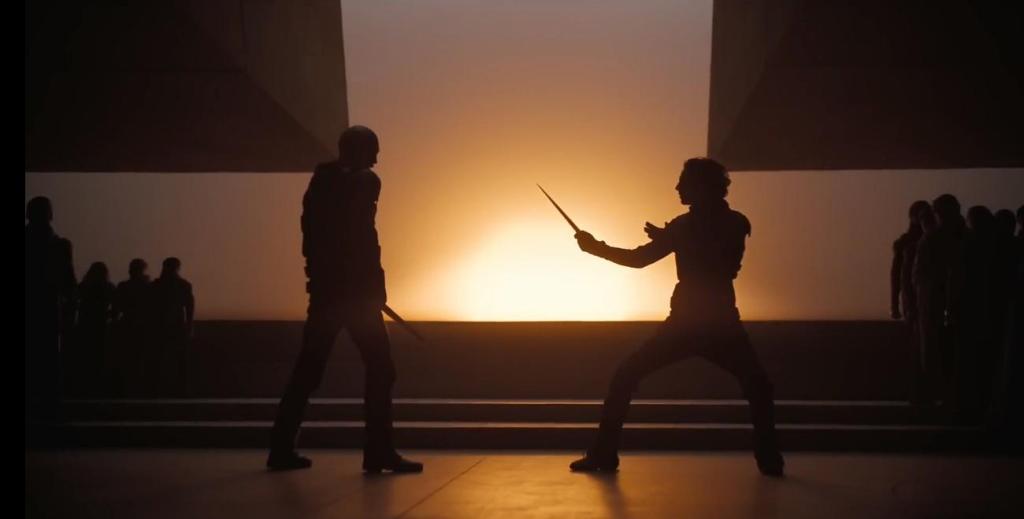The concepts explored in Thomas Pynchon’s “Gravity’s Rainbow” are highly relevant to the subjects I will discuss in this composition. Unfortunately, for all of its literary esteem, I only made it a few chapters in before giving up and declaring it one of the most boring books I’ve ever attempted to read. The dispatching of the V-2 rocket – the primary topic of “Gravity’s Rainbow” – plays an important yet subtle role in Christopher Nolan’s Oppenheimer, but not enough to warrant me powering through the dryness of Pynchon’s celebrated novel. With this, the V-2 rocket was one of the first awe-inspiring missile assemblies capable of administering mass destruction. The innate need for humans to destroy (i.e. The Death Instinct) is the fabric of everything Oppenheimer as a film looks to examine. The mutually assured destruction through the global creation of atomic weapons, the complicity of destruction through neutral principles, and the dangers of insisting on picking a side. So, does the film illustrate a path of self-destruction we are incapable of avoiding, or, to paraphrase Jean Tatlock from the film, do we use this knowledge to channel our efforts into collective improvement?

Can You Hear the Music?
Complicity, in relation to the moral greys of life itself, was a common theme in film throughout 2023. Oppenheimer, Killers of the Flower Moon, and The Zone of Interest all demonstrate what the indirect contributions to mass genocide look like (two of which refer to the same historical conflict). Throughout history, the idea of shifting the blame to better connect two contradicting ideologies has been a political and economic strategy that has often resulted in these atrocities. In Kai Bird & Martin J. Sherwin’s biography “American Prometheus” (which the film is adapted from), J. Robert Oppenheimer is described as an enigmatic patriot whose open-mindedness can be attributed to his brilliance as well as his deficiencies.
As a firstborn Jewish-American of German descent, Oppenheimer’s personal stake in the development of the atomic bomb was glaringly apparent; something the film perfectly addresses. It’s this personal angle that attaches itself to the film’s split point of view (the objective side I’ll get to later). Oppenheimer sees the creation of the atomic bomb as a necessity for not just preventing fascism from obtaining destructive power, but in ensuring world peace through arms control. But in taking action to maximize world peace through mutually assured destruction, Oppenheimer’s hubris prevents him from remembering a crucial inevitability: actions have consequences.
Christopher Nolan loves to deconstruct the self-destructive capacities of humans. Most of his films do in some way but as his first biographical film, Oppenheimer gets this point across through a non-fictitious lens. Some have understandably criticized the film for not including the Japanese point of view on this event given the futile attacks on Hiroshima and Nagasaki. I won’t use the character study explanation for why this is absent because even though the film is about Oppenheimer, the film still deviates to an objective point of view on Oppenheimer’s actions. The film itself is about the complicit actions of those with diplomatic influence. Acting as a political drama for the first half, we see large amounts of seemingly indivisible men determining how and where to detonate a weapon of mass destruction. Almost none of those involved with this decision-making process face any on-screen consequences for their actions. Except one.

A Lowly Shoe Salesman
The very beginning of Oppenheimer has a succinct approach to where our attention should be focused. One part, as described as “Fission”, is the subjective viewpoint. The other side, as described as “Fusion”, is the objective. For this section, I’d like to talk about Lewis Strauss. After watching this film several times, Strauss has become my favorite character in the film. Not because I believe in anything he stands for (all of which I vehemently disagree with), but for what he represents to the story. The introduction of Strauss frames him as a political intellectual who looks up to Oppenheimer as a figure to be admired. As the film progresses, we begin to see his complacency, ambitious arrogance, and petty dispositions in a classic story of why not to meet your heroes. Strauss is an insidious man whose black & white views juxtapose the cognitive dissonance of Oppenheimer.
“American Prometheus” describes Strauss as an “ardent foe” of New Deal democrats with dangerous authority in bureaucratic warfare. Strauss’ bitter vendetta leads to him extinguishing Oppenheimer’s political influence through a closed inquisition based on dubious accusations. In a narrative that parallels Oppenheimer’s, Strauss eventually faces the consequences of his own actions as he sees his reputation publicly tarnished in a Senate hearing. It’s a satisfying comeuppance for an antagonist that stays on theme and serves as a cautionary tale of self-righteousness. Robert Downey Jr. gives a career-best performance as Strauss.

Atmospheric Ignition
One of my absolute favorite sequences in the movie involves a scene of Oppenheimer being interrogated by Manhattan Project security officer Colonel Boris Pash. While this altercation predates the period of The Red Scare, it exhibits the intense anti-communist sentiments that would eventually usurp the political landscape of the Joseph McCarthy era. The hysteria McCarthyism caused can be followed up with the Islamophobia of post 9/11 America or the recent converse of Zionism. None of this holds any ethical merit but serves as nationalist propaganda meant to shift public perception and fuel political agendas.
Margaret Chase Smith, the first woman to serve in both the U.S. House of Representatives and Senate, publicly addressed the absurdity of McCarthy’s endorsement of blacklisting those who sympathized with red. The weaponization of McCarthyism is constantly present in Oppenheimer as a means of showing how people behaved during the Cold War and how the titular character’s academic interests were used against him. All of this culminates in a scene involving Kitty Oppenheimer’s deposition (performed wonderfully by Emily Blunt) as she combats the meaningless accusations of these McCarthyistic sentiments. It boils down to a consciousness of neutrality that Oppenheimer seems to uphold which may be my favorite theme in the entire film.
Oppenheimer discusses just how and why neutrality can be one’s downfall. Many feel that those who choose to remain blissfully absent-minded from crimes against humanity are as complicit as the perpetrators. Many would be right but it’s a tightrope to walk in setting these moral greys in stone. For every transgression on one side, there’s likely an equal and opposite one on the other side. That’s the balancing act of acting selfishness vs. altruism. By the end of the story, many of the supporting characters, and most especially Oppenheimer himself, seek absolution for their moral crimes in a theme that ties itself to the film’s opening quote regarding the Greek god Prometheus.

Something More Important
While this film lacks holistically virtuous characters, the study of a complex individual leaves us as the viewers with a lot to process. To answer the subtitle of this piece, this film is a haunting exercise of how two wrongs do not make a right, leaving us with the haunting reality of how genius can be manipulated for evil. Writer/director Christopher Nolan paces this 3-hour historical epic as if it were an action movie with some of the snappiest editing working in tandem with some of the sharpest dialogue.
I’ve spent time thinking about how the apple at the beginning of the film acts as a visual metaphor for destruction. Oppenheimer poisons the apple with malicious intent but retracts the action when he recognizes what he’s done. While the apple never reaches its full destructive potential, the idea of it persists throughout the film until eventually, the titular figure faces the consequences of his actions. The entire moral argument of the film can be summarized by Kitty’s line “You don’t get to commit the sin, then have us all feel sorry for you that it had consequences.” None of us are inherently entitled to this luxury (unless maybe you’re a toddler). By the end, Oppenheimer and Strauss are left with nothing but permanent earth-shattering reminders of their mistakes.
I have no shame in declaring this as the greatest film of the 21st century for its importance to both history and the climate of today. The conjunctive efforts of the cast and crew are unmatched. From the ensemble, to Ludwig Görrenson’s infectious score, to all visual technicalities, the amalgamation of this film’s sophistication goes beyond what I as a viewer thought anyone was capable of in the medium. All of this is anchored by a generational performance by Cillian Murphy.
Oppenheimer is a case study on where we go when left to our own devices. How we manipulate our control systems to justify our actions and how we grapple with the repercussions of such actions. The film asks us to question for ourselves if our regrettable actions will eternally make us persona non grata, or if after time we are worthy of forgiveness. When put on trial, who’d want to justify their whole life?




Leave a comment